

Dell EMC PowerScale for Developing Autonomous Driving Vehicles
Wed, 24 Apr 2024 13:01:04 -0000
|Read Time: 0 minutes
Competition in the era of autonomy
The automotive industry is in a highly competitive transitional period where success is not about winning, it’s about survival. Once an industry of pure hardware and adrenaline, automotive design is increasingly dependent upon, and differentiated by, software. This is especially true for Advanced Driver Assistance Systems (ADAS) development, which is introducing disruptive requirements on engineering IT Infrastructure – particularly storage, where even entry level capacities are measured in petabytes.
SAE International, formerly known as the Society of Automotive Engineers, has defined different levels of automation. Most modern cars today have features that are at level 2-3. Today’s SAE level 3 ADAS projects have already outstripped legacy storage solutions, and with level 4 and 5 projects around the corner, the need for storage solutions optimized for high performance, high concurrency, and massive scalability has never been greater.
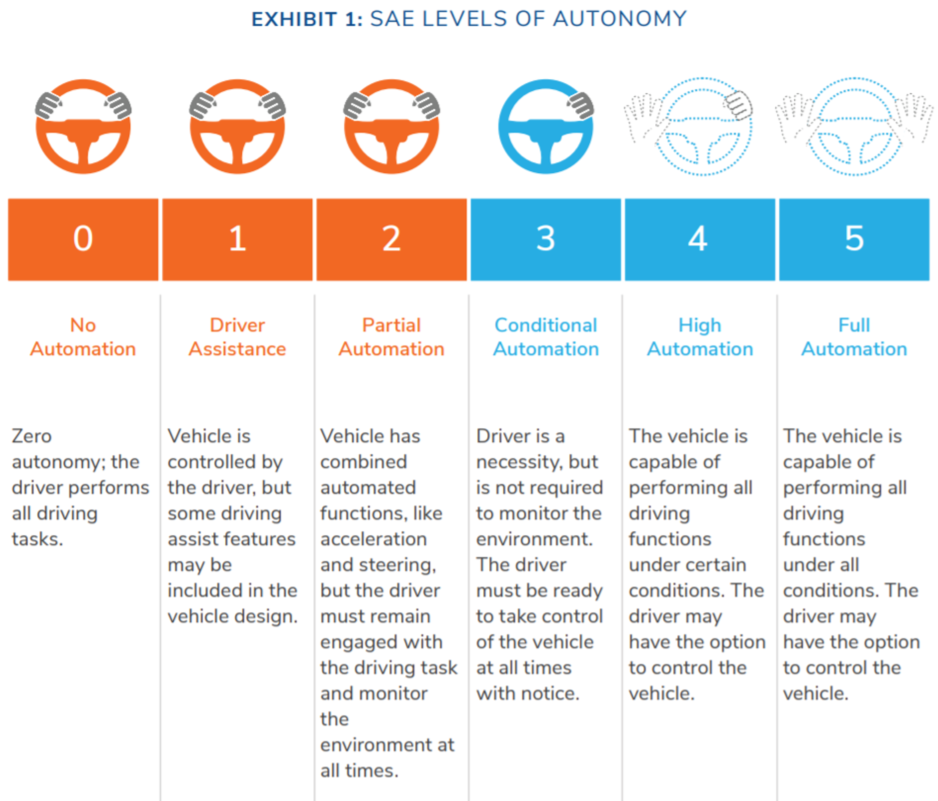
The value of data
As ADAS solutions evolve from simple collision-avoidance systems to fully autonomous vehicles, these systems will combine complex sensing, processing, and algorithmic technologies. This vehicle-generated data is a critical component to improving ADAS systems, feeding into integrated test and development cycles (or development tool chains) for these systems.
In addition to vehicular data, ADAS Test and Development systems in the next three to five years will also rely on inputs from infrastructure to support the growing scale of data movement, computing, and storing required between the vehicles, across the edge, through the cloud, and within on-premises environments. Such data will support ongoing modifications to current simulation, SiL (Software in-the-Loop), and HiL (Hardware-in-the-Loop) testing to improve the reliability of services after deployment.
The following figure illustrates the typical ADAS development life cycle for automotive OEMs and suppliers leveraging the Dell EMC PowerScale scale-out NAS as the central data lake with our Data Management Systems (DMS) for ADAS:
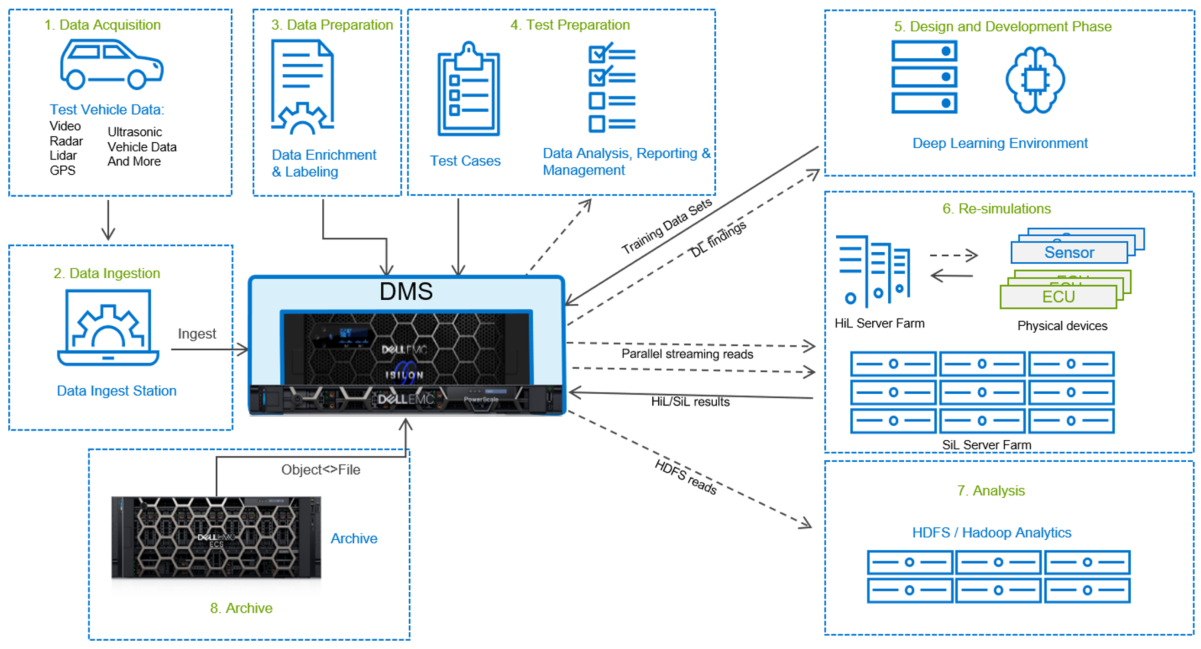
Scaling and evolving ADAS systems will require a seamless data management process and IT infrastructure that is flexible enough to handle challenges such as:
- Future-proofing ADAS simulation and architecture, to adapt to changes in vehicle sensors and other environmental data points.
- Managing data storage to comply with regulatory and privacy requirements, while addressing performance, security, and accessibility needs.
- Analyzing massive volumes of unstructured data sets, to support analytical modelling and querying of ADAS data. This requires costly and time-consuming data preparation steps, such as labeling data for analysis.
- Most of the sensor data is required to be used for quick data restoration for decades, so it has to be added to long term archives.
Ideally architected for ADAS development and certification, Dell EMC PowerScale provides the scalability, performance, parallelism, and easy to use management tools to help OEMs and Tier-1 suppliers accelerate their ADAS projects. PowerScale supports simultaneous ingest from thousands of concurrent streams from around the globe, provides simultaneous access for Model-in-the-loop (MIl), Hardware in the loop (HiL), Software in the loop (SiL) testing, Deep Learning/AI, and includes archive options to meet regulatory resimulation SLAs.
Accelerate and scale your ADAS/AD development success
The data management and computational demands underpinning the ADAS/AD (autonomous driving) test and dev environment are substantial and require solutions that can scale to accommodate complex exponentially growing ADAS/AD data sets. Essential to helping ADAS/AD development teams unlock the data and create value is a high performance and high-capacity platform that can provide the following:
- A consistent, high throughput solution to ingest data from test vehicles while simultaneously delivering the test data into hundreds to thousands of concurrent streams to MiL/SiL/HiL servers, test stands, and even deep learning training. It must also scale performance near-linearly, so performance isn’t degraded as capacity is added—critical for ADAS development where sensor data ingest rates of 2 PB+ per week are becoming common.
- A high performance and predictable storage solution that will scale and manage ADAS/AD data sets and workloads as they grow centrally and regionally. Essential elements of the platform include an expandable single namespace, eliminating data silos by consolidating all globally collected ADAS/AD data; automated plug and play hardware detection and expansion that won’t disrupt ongoing projects; automated policy-based tiering to reduce file server sprawl and performance bottlenecks; and file-object orchestration and encryption that will allow data movement between high performance network-attached storage and lower-cost private and public cloud options.
- Distributed deep learning frameworks are core to unlocking data capital and foundational to ADAS and AD development. Because deep learning models are very complex and large, developers can benefit from using a deep learning framework — an interface, library, or tool that allows them to leverage deep learning easily and quickly, without requiring in-depth understanding of the underlying algorithms. These frameworks provide a clear and concise way for defining models using a collection of pre-built and pre-optimized components. Essential characteristics of well-designed deep learning frameworks, such as Tensorflow, Keras, PyTorch, and Caffe, including optimization for GPU performance, easy to understand code, extensive community support, process parallelization to reduce computation cycles, and automatically computed gradients.
- An optimized and scalable accelerator-based platform that has the capacity and ability to run AI in place as well as deep learning (training) and MiL/HiL/SiL workloads. Engineers and data scientists continuously manage massive data sets and compute-intensive workloads to run their ADAS/AD test and dev operations across departments and around the globe. A large capacity and distributed GPU-based compute and storage infrastructure gives development teams the ability to rapidly build, train, and deploy test cases and AI models, predictive analytics, simulations, and re-simulations.
Top reasons to choose Dell EMC PowerScale for ADAS/AD
Small footprint, big performance for the edge
PowerScale F200 and F600 are new small-scale all flash nodes offering high throughput for small deployment scenarios such as on-prem data caching, required when streaming data from public cloud for Hardware-in-the-Loop (HiL) testing, or regional sensor data ingest stations. These low-cost nodes can be added to existing PowerScale/Isilon clusters - making it simple to expand with high performance.

Massive scalability for the data center
AD/ADAS datasets are growing exponentially, with requirements ranging from petabytes to exabytes of data. Dell EMC PowerScale scales as your needs grow so you can invest in infrastructure that fits your current ADAS storage requirements without overbuying performance or capacity. Scalable to tens of petabytes (PB) in a single cluster, PowerScale offers truly scalable performance and an ever-expanding single namespace that eliminates data silos by consolidating all globally collected ADAS/AD data. Tools like CloudPools take this scalability into the exabyte (EB) range, allowing data to be moved between the high-performance NAS and multiple lower-cost storage options like Dell EMC ECS object storage.
Throughput to accelerate ADAS/AD time-to-market
PowerScale delivers the consistent, high throughput required to concurrently deliver test data into hundreds to thousands of MiL/SiL/HiL servers, test stands, and Deep Learning networks simultaneously. Multiple node types can be deployed within a single cluster, so you can deploy the storage infrastructure that meets your exact needs from high performance all-flash for AI to low-cost SATA for long term archiving. PowerScale also scales performance linearly as additional capacity is added to the cluster – critical for ADAS development where sensor data ingest rates of 2PB+ per week are becoming common.
Maintain sensor data compliance
Most ADAS projects face strict requirements for data compliance and retention, including data privacy, physical media security, and even service level agreements (SLAs) that dictate retention of petabytes to exabytes of data for decades, with as little as a few days’ notice for full data restoration. Policy-based SmartPools and CloudPools alleviate SLA challenges by automatically tiering data to lower cost storage for long-term retention, and to higher-performance storage for revalidation. Keeping sensor test and verification data within easy reach avoids the “mad-dash” to restore large data sets from archive in the case of a defect, safety recall, or audit. The necessary data remains directly accessible within the PowerScale and ECS storage infrastructure. To protect sensitive sensor data, CloudPools fully encrypts data before offloading it to the target, which can include your own on-premises Dell EMC ECS object storage and third-party providers.
Debug designs faster
The PowerScale OneFS operating system includes native multi-protocol support so workflows can quickly access data stored on a single cluster, eliminating the need for additional data movement. OneFS offers simultaneous access to all PowerScale nodes for a mix of AD/ADAS workloads from data ingest, MiL, SiL, and HiL testing, to Deep Learning using TensorFlow. OneFS also supports data enrichment with access to on-line databases for weather, GPS location queries, road surface types, and so on. In-place analytics for sensor data and simulation results eliminates the time and expense of moving large data sets between file and other storage solutions typically required. Multi-protocol support includes NFS, SMB, HDFS, SWIFT, HTTP, REST, and others. OneFS also supports S3, an essential protocol for cloud native applications. PowerScale easily integrates with the Dell EMC streaming data platform, offering insights on real-time and historical sensor data.
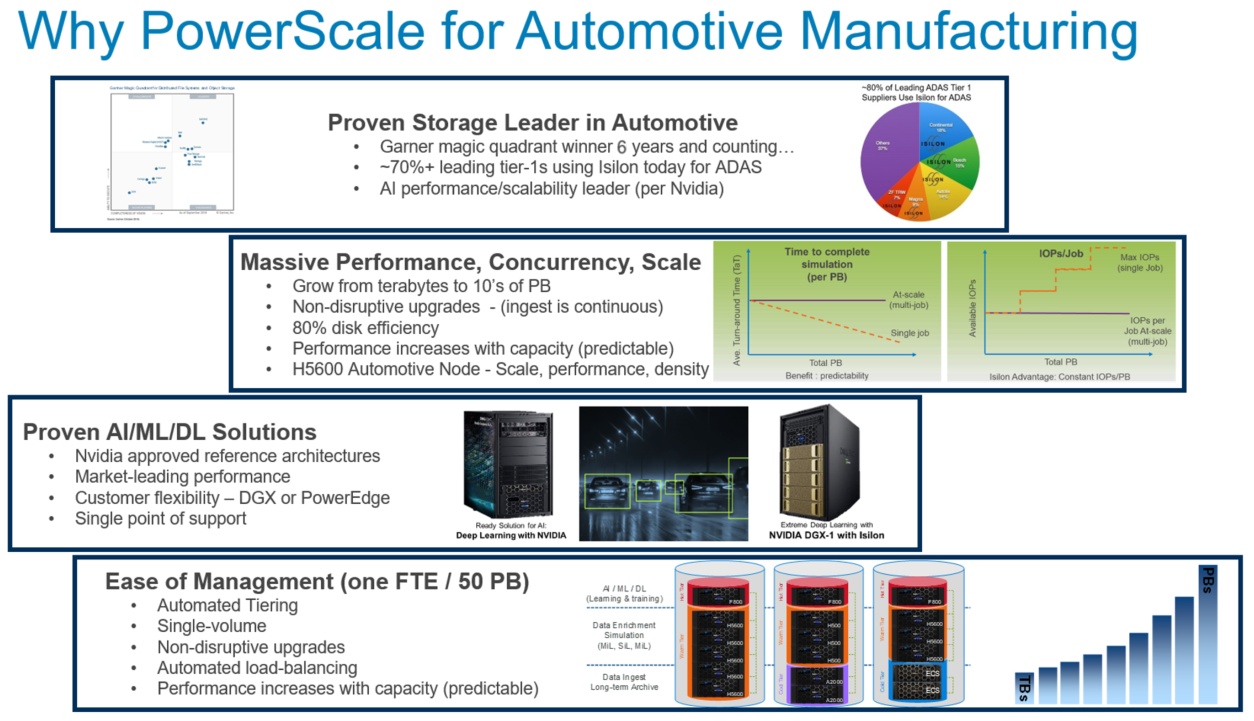
Dell complete solutions: a complete autonomous driving data lake reference architecture
Our new Dell Autonomous Drive ecosystem supports the most important steps in the ADAS/AD data process. Developed in conjunction with leading industry and technology partners, Dell Autonomous Drive combines Dell Technologies and partner infrastructure, software, and services to offer a complete end-to-end toolchain.
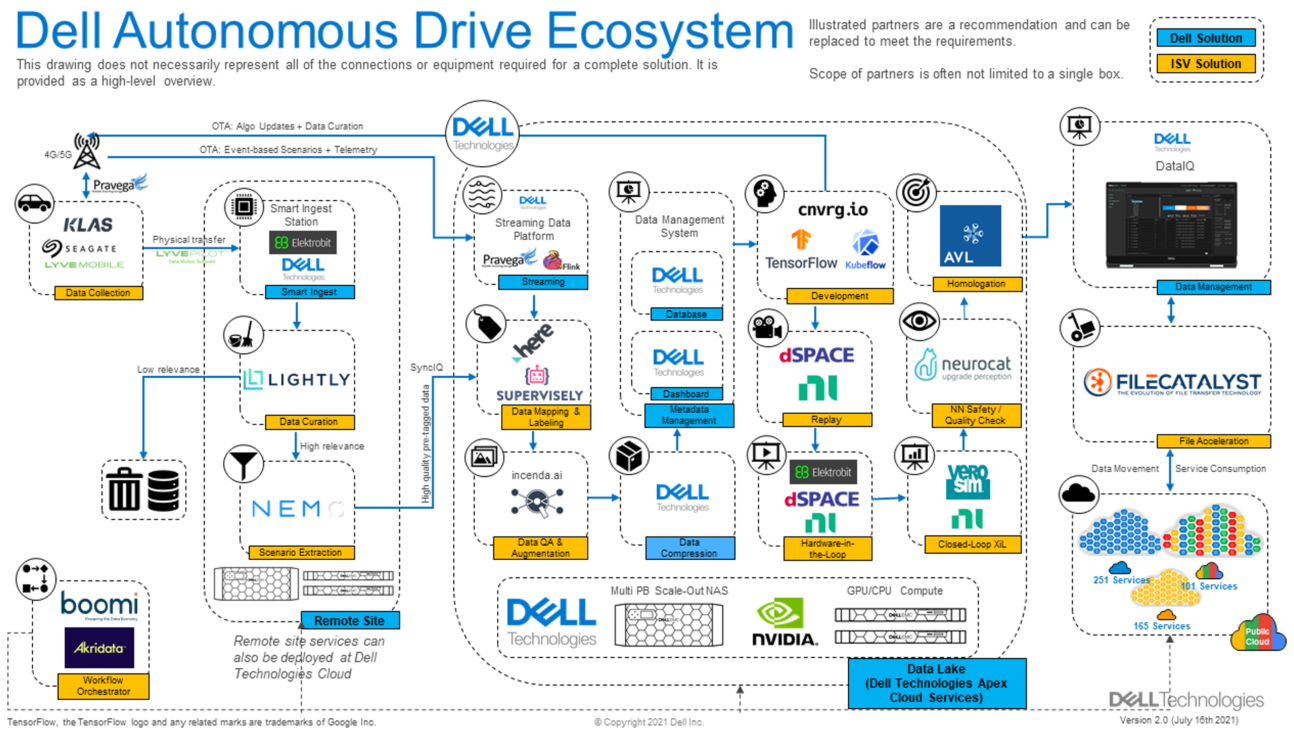
For more information:
- See the blog What DevOps for AD/ADAS Looks Like.
- See our white paper Dell Technologies Automotive Solutions.
- For regularly updated automotive industry events and content, please bookmark https://Dell.to/automotive-events.
- Stay tuned for future blogs!
Author: Frances Weiyi Hu LinkedIn
Related Blog Posts

Setting Up PowerScale for Google Cloud SmartConnect
Wed, 29 Dec 2021 17:48:23 -0000
|Read Time: 0 minutes
In the Dell EMC PowerScale for Google Cloud solution, OneFS uses the cluster service FQDN as its SmartConnect Zone name with a round-robin client-connection balancing policy. The round-robin policy is a default setting and is recommended for most cases in OneFS. (For more details about the OneFS SmartConnect load-balancing policy, see the Load Balancing section of the white paper Dell EMC PowerScale: Network Design Considerations.)
After the cluster is deployed, you must find the OneFS SmartConnect service IP in the clusters page within Google Cloud Console. Then, configure your DNS server to delegate the cluster service FQDN zone to the OneFS Service IP. You need to configure a forwarding rule in Google Cloud DNS which forwards the cluster service FQDN query to the DNS server, and set up a zone delegation on the DNS server that points to the cluster service IP. The following figure shows the DNS query flow by leveraging Google Cloud DNS along with a DNS server in the project.
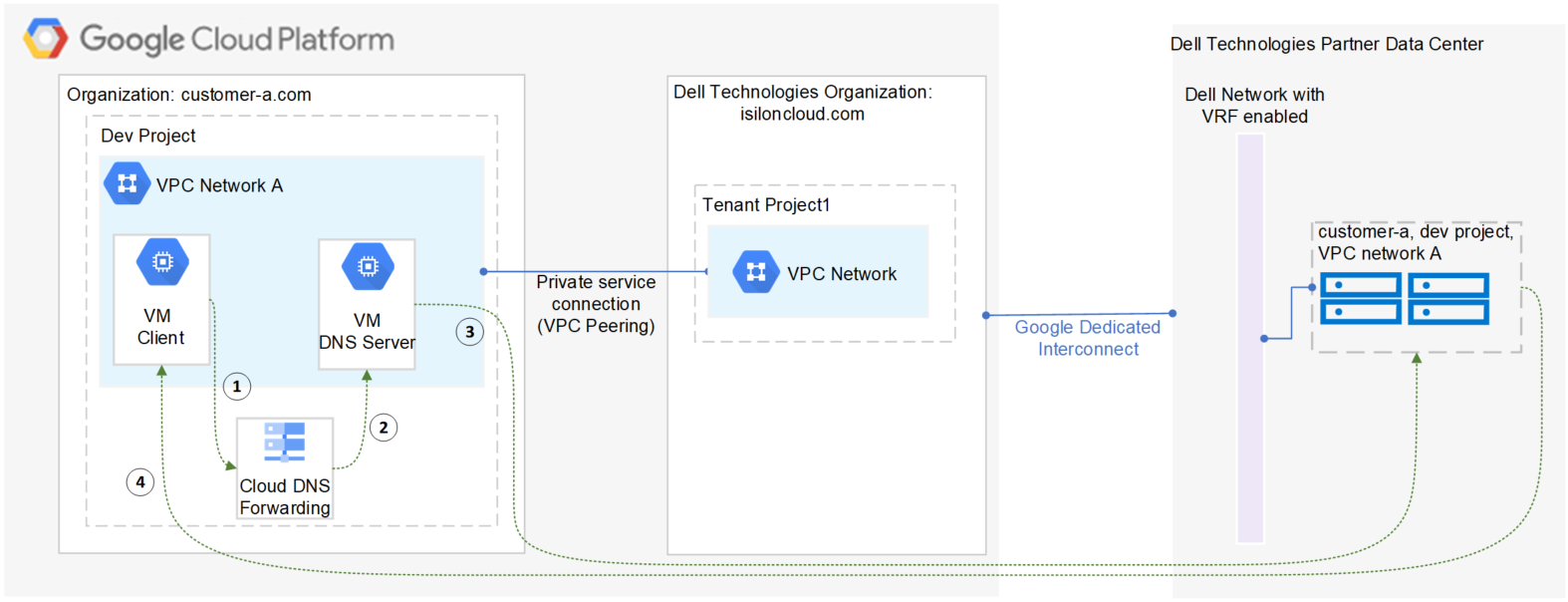
- VM clients send a DNS request for Cluster service FQDN to the Google Cloud DNS service.
- Google Cloud DNS forwards the request to the DNS server.
- The DNS server forwards the request to the cluster service IP. The service IP is responsible for translating the cluster service IP into an available node IP.
- SmartConnect returns a node IP to the client. The client can now access cluster data.
Because Google Cloud DNS cannot communicate with the OneFS cluster directly, we use a DNS server that is located in the authorized VPC network to forward the SmartConnect DNS request to the cluster. You can use either a Windows server or a Linux server. In this blog we use a Windows server to show the detailed steps.
Obtain required cluster information
The following information is required before setting up SmartConnect:
- Cluster service FQDN -- This is the OneFS SmartConnect zone name used by clients.
- Service IP -- This is the OneFS SmartConnect service IP that is responsible for resolving the client DNS request and returning an available node IP to clients.
- Authorized network -- By default, only the machines on an authorized VPC network can access a PowerScale cluster.
To obtain this required information, do the following:
- In the Google Cloud Console navigation menu, click PowerScale and then click Clusters.
- Find your cluster row, where you can see the cluster service FQDN and service IP:

3. To find the authorized network information, click the name of the cluster. From the PowerScale Cluster Details page, find the authorized network from the Network information, highlighted here:
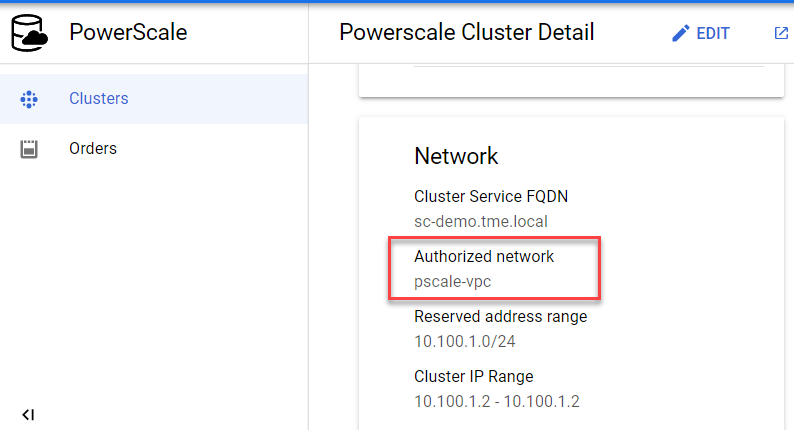
Set up a DNS server
If you already have an available DNS server that is connected to the cluster authorized network, you can use this existing DNS server and skip Step 1 and Step 2 below.
- In the Google Cloud Console navigation menu, click Compute Engine and then click VM instances. In this example, we are creating a Windows VM instance as a DNS server. Make sure your DNS server is connected to the cluster authorized network.
- Log into the DNS server and install DNS Server Role in the Windows machine. (If you are using a Linux machine, you can use Bind software instead.)
- Create a new DNS zone in the DNS server:
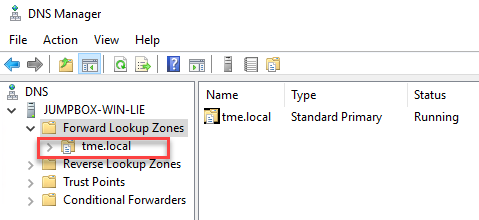
4. Create an (A) record for the cluster service IP. (See the section DNS delegation best practices of the white paper Dell EMC PowerScale: Network Design Considerations for more details.)

5. Create a new delegation for your cluster service FQDN (sc-demo.tme.local in this example) and point the delegation server to your cluster service IP (A) record created above (sip-demo.tme.local in this example), as shown here:

Configure Cloud DNS and firewall rules
- In the Google Cloud Console navigation menu, click Network services and then click Cloud DNS.
- Click the CREATE ZONE button.
- Choose the Private zone type and enter your Cluster Service FQDN in the DNS name field. Choose Forward queries to another server and your cluster authorized network, as shown here:
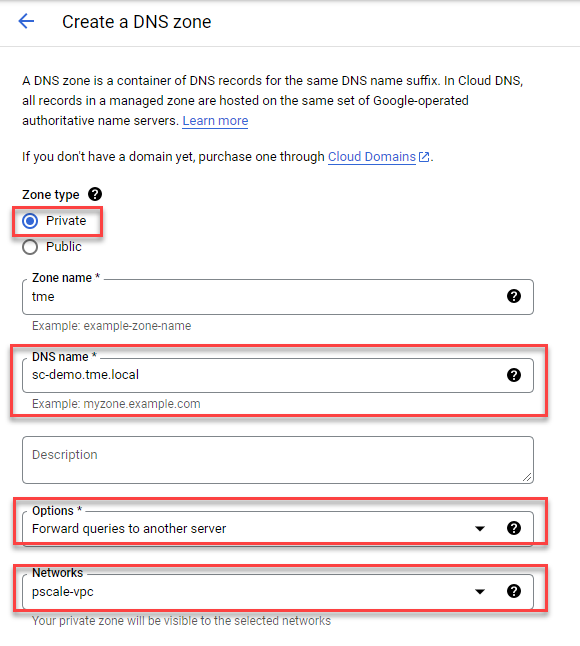
4. Obtain the DNS server IP address that you configured in the ‘Set up a DNS server’ step.
5. Point the destination DNS server to your own DNS server IP address, then click the Create button.

6. Add firewall rules to allow ingress DNS traffic to your DNS server from Cloud DNS. In the Google Cloud Console navigation menu, click VPC network and then click Firewall.
7. Click the CREATE FIREWALL RULE button.
8. Create a new Firewall rule and include the following options:
- In the Network field, make sure the cluster authorized network is selected.
- Source filter: IPv4 ranges
- Source IPv4 ranges: 35.199.192.0/19. This is the IP range Cloud DNS requests will originate from. See Cloud DNS zones overview for more details.
- Protocols and ports: TCP 53 and UDP 53.
See the following example:
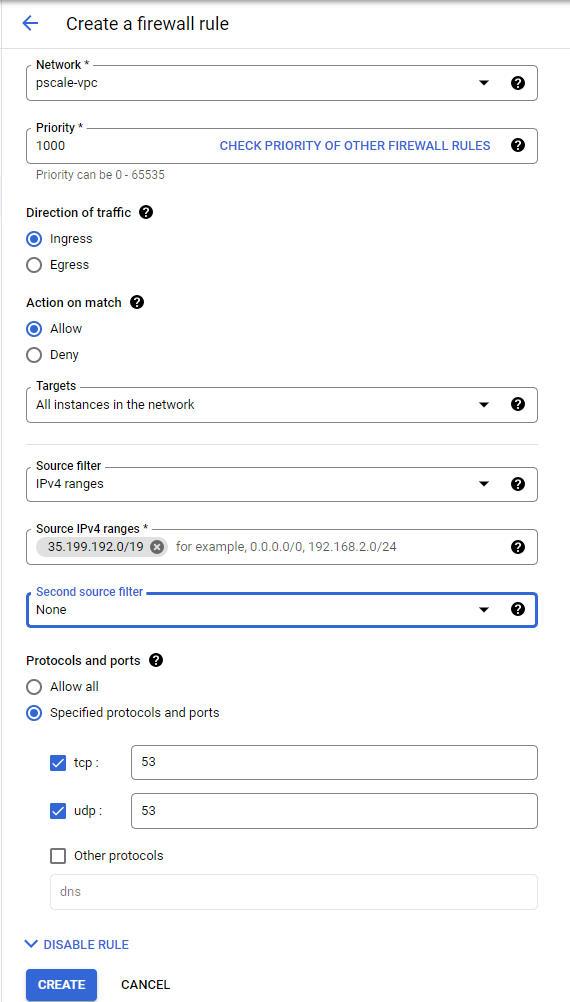
4. The resulting firewall rule in Google Cloud will appear as follows:

Verify your SmartConnect
- Log into a VM instance that is connected to an authorized network. (This example uses a Linux machine.)
- Resolve the cluster service FQDN via nslookup and mount a file share via NFS.
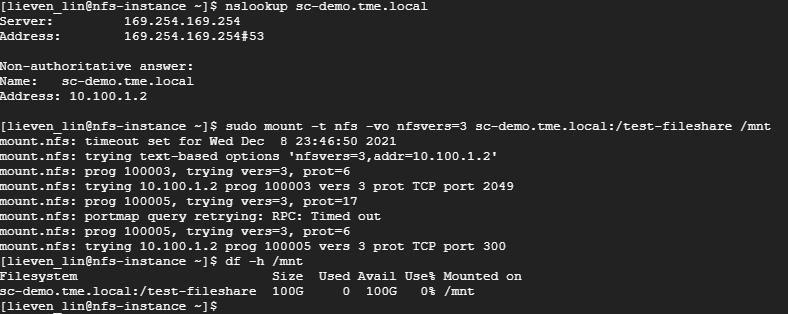
Conclusion
PowerScale cluster is a distributed file system composed of multiple nodes. We always recommend using the SmartConnect feature to balance the client connections to all cluster nodes. This way, you can maximize PowerScale cluster performance to provide maximum value to your business. Try it now in your Dell EMC PowerScale for Google Cloud solution.
Author: Lieven Lin

OneFS Data Inlining – Performance and Monitoring
Tue, 16 Nov 2021 19:57:36 -0000
|Read Time: 0 minutes
In the second of this series of articles on data inlining, we’ll shift the focus to monitoring and performance.
The storage efficiency potential of inode inlining can be significant for data sets comprising large numbers of small files, which would have required a separate inode and data blocks for housing these files prior to OneFS 9.3.
Latency-wise, the write performance for inlined file writes is typically comparable or slightly better as compared to regular files, because OneFS does not have to allocate extra blocks and protect them. This is also true for reads, because OneFS doesn’t have to search for and retrieve any blocks beyond the inode itself. This also frees up space in the OneFS read caching layers, as well as on disk, in addition to requiring fewer CPU cycles.
The following figure illustrates the levels of indirection a file access request takes to get to its data. Unlike a standard file, an inline file skips the later stages of the path, which involve the inode metatree redirection to the remote data blocks.
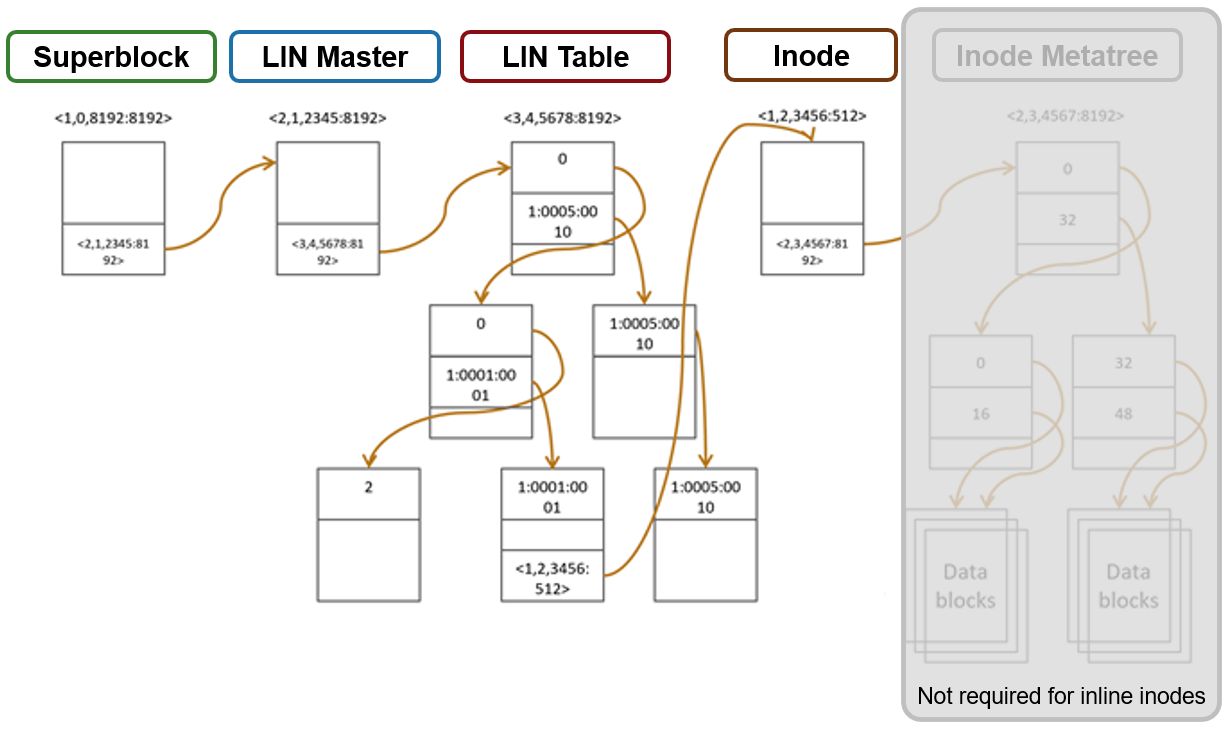
Access starts with the Superblock, which is located at multiple fixed block addresses on each drive in the cluster. The Superblock contains the address locations of the LIN Master block, which contains the root of the LIN B+ Tree (LIN table). The LIN B+Tree maps logical inode numbers to the actual inode addresses on disk, which, in the case of an inlined file, also contains the data. This saves the overhead of finding the address locations of the file’s data blocks and retrieving data from them.
For hybrid nodes with sufficient SSD capacity, using the metadata-write SSD strategy automatically places inlined small files on flash media. However, because the SSDs on hybrid nodes default to 512byte formatting, when using metadata read/write strategies, you must set the ‘–force-8k-inodes’ flag for these SSD metadata pools in order for files to be inlined. This can be a useful performance configuration for small file HPC workloads, such as EDA, for data that is not residing on an all-flash tier. But keep in mind that forcing 8KB inodes on a hybrid pool’s SSDs will result in a considerable reduction in available inode capacity than would be available with the default 512 byte inode configuration.
You can use the OneFS ‘isi_drivenum’ CLI command to verify the drive block sizes in a node. For example, the following output for a PowerScale Gen6 H-series node shows drive Bay 1 containing an SSD with 4KB physical formatting and 512byte logical sizes, and Bays A to E comprising hard disks (HDDs) with both 4KB logical and physical formatting.
# isi_drivenum -bz Bay 1 Physical Block Size: 4096 Logical Block Size: 512 Bay 2 Physical Block Size: N/A Logical Block Size: N/A Bay A0 Physical Block Size: 4096 Logical Block Size: 4096 Bay A1 Physical Block Size: 4096 Logical Block Size: 4096 Bay A2 Physical Block Size: 4096 Logical Block Size: 4096 Bay B0 Physical Block Size: 4096 Logical Block Size: 4096 Bay B1 Physical Block Size: 4096 Logical Block Size: 4096 Bay B2 Physical Block Size: 4096 Logical Block Size: 4096 Bay C0 Physical Block Size: 4096 Logical Block Size: 4096 Bay C1 Physical Block Size: 4096 Logical Block Size: 4096 Bay C2 Physical Block Size: 4096 Logical Block Size: 4096 Bay D0 Physical Block Size: 4096 Logical Block Size: 4096 Bay D1 Physical Block Size: 4096 Logical Block Size: 4096 Bay D2 Physical Block Size: 4096 Logical Block Size: 4096 Bay E0 Physical Block Size: 4096 Logical Block Size: 4096 Bay E1 Physical Block Size: 4096 Logical Block Size: 4096 Bay E2 Physical Block Size: 4096 Logical Block Size: 4096
Note that the SSD disk pools used in PowerScale hybrid nodes that are configured for meta-read or meta-write SSD strategies use 512 byte inodes by default. This can significantly save space on these pools, because they often have limited capacity, but it will prevent data inlining from occurring. By contrast, PowerScale all-flash nodepools are configured by default for 8KB inodes.
The OneFS ‘isi get’ CLI command provides a convenient method to verify which size inodes are in use in a given node pool. The command’s output includes both the inode mirrors size and the inline status of a file.
When it comes to efficiency reporting, OneFS 9.3 provides three CLI improved tools for validating and reporting the presence and benefits of data inlining, namely:
- The ‘isi statistics data-reduction’ CLI command has been enhanced to report inlined data metrics, including both a capacity saved and an inlined data efficiency ratio:
# isi statistics data-reduction Recent Writes Cluster Data Reduction (5 mins) --------------------- ------------- ---------------------- Logical data 90.16G 18.05T Zero-removal saved 0 - Deduplication saved 5.25G 624.51G Compression saved 2.08G 303.46G Inlined data saved 1.35G 2.83T Preprotected physical 82.83G 14.32T Protection overhead 13.92G 2.13T Protected physical 96.74G 26.28T Zero removal ratio 1.00 : 1 - Deduplication ratio 1.06 : 1 1.03 : 1 Compression ratio 1.03 : 1 1.02 : 1 Data reduction ratio 1.09 : 1 1.05 : 1 Inlined data ratio 1.02 : 1 1.20 : 1 Efficiency ratio 0.93 : 1 0.69 : 1
Be aware that the effect of data inlining is not included in the data reduction ratio because it is not actually reducing the data in any way – just relocating it and protecting it more efficiently. However, data inlining is included in the overall storage efficiency ratio.
The ‘inline data saved’ value represents the count of files which have been inlined, multiplied by 8KB (inode size). This value is required to make the compression ratio and data reduction ratio correct.
- The ‘isi_cstats’ CLI command now includes the accounted number of inlined files within /ifs, which is displayed by default in its console output.
# isi_cstats
Total files : 397234451
Total inlined files : 379948336
Total directories : 32380092
Total logical data : 18471 GB
Total shadowed data : 624 GB
Total physical data : 26890 GB
Total reduced data : 14645 GB
Total protection data : 2181 GB
Total inode data : 9748 GB
Current logical data : 18471 GB
Current shadowed data : 624 GB
Current physical data : 26878 GB
Snapshot logical data : 0 B
Snapshot shadowed data : 0 B
Snapshot physical data : 32768 B
Total inlined data savings : 2899 GB
Total inlined data ratio : 1.1979 : 1
Total compression savings : 303 GB
Total compression ratio : 1.0173 : 1
Total deduplication savings : 624 GB
Total deduplication ratio : 1.0350 : 1
Total containerized data : 0 B
Total container efficiency : 1.0000 : 1
Total data reduction ratio : 1.0529 : 1
Total storage efficiency : 0.6869 : 1
Raw counts
{ type=bsin files=3889 lsize=314023936 pblk=1596633 refs=81840315 data=18449 prot=25474 ibyte=23381504 fsize=8351563907072 iblocks=0 }
{ type=csin files=0 lsize=0 pblk=0 refs=0 data=0 prot=0 ibyte=0 fsize=0 iblocks=0 }
{ type=hdir files=32380091 lsize=0 pblk=35537884 refs=0 data=0 prot=0 ibyte=1020737587200 fsize=0 iblocks=0 }
{ type=hfile files=397230562 lsize=19832702476288 pblk=2209730024 refs=81801976 data=1919481750 prot=285828971 ibyte=9446188553728 fsize=17202141701528 iblocks=379948336 }
{ type=sdir files=1 lsize=0 pblk=0 refs=0 data=0 prot=0 ibyte=32768 fsize=0 iblocks=0 }
{ type=sfile files=0 lsize=0 pblk=0 refs=0 data=0 prot=0 ibyte=0 fsize=0 iblocks=0 }- The ‘isi get’ CLI command can be used to determine whether a file has been inlined. The output reports a file’s logical ‘size’, but indicates that it consumes zero physical, data, and protection blocks. There is now also an ‘inlined data’ attribute further down in the output that also confirms that the file is inlined.
# isi get -DD file1 * Size: 2 * Physical Blocks: 0 * Phys. Data Blocks: 0 * Protection Blocks: 0 * Logical Size: 8192 PROTECTION GROUPS * Dynamic Attributes (6 bytes): * ATTRIBUTE OFFSET SIZE Policy Domains 0 6 INLINED DATA 0,0,0:8192[DIRTY]#1
So, in summary, some considerations and recommended practices for data inlining in OneFS 9.3 include the following:
- Data inlining is opportunistic and is only supported on node pools with 8KB inodes.
- No additional software, hardware, or licenses are required for data inlining.
- There are no CLI or WebUI management controls for data inlining.
- Data inlining is automatically enabled on applicable nodepools after an upgrade to OneFS 9.3 is committed.
- However, data inlining occurs for new writes and OneFS 9.3 does not perform any inlining during the upgrade process. Any applicable small files are instead inlined upon their first write.
- Since inode inlining is automatically enabled globally on clusters running OneFS 9.3, OneFS recognizes any diskpools with 512 byte inodes and transparently avoids inlining data on them.
- In OneFS 9.3, data inlining is not performed on regular files during tiering, truncation, upgrade, and so on.
- CloudPools Smartlink stubs, sparse files, and writable snapshot files are also not candidates for data inlining in OneFS 9.3.
- OneFS shadow stores do not apply data inlining. As such:
- Small file packing is disabled for inlined data files.
- Cloning works as expected with inlined data files.
- Inlined data files do not apply deduping. Non-inlined data files that are once deduped will not inline afterwards.
- Certain operations may cause data inlining to be reversed, such as moving files from an 8KB diskpool to a 512 byte diskpool, forcefully allocating blocks on a file, sparse punching, and so on.
The new OneFS 9.3 data inlining feature delivers on the promise of small file storage efficiency at scale, providing significant storage cost savings, without sacrificing performance, ease of use, or data protection.
Author: Nick Trimbee




